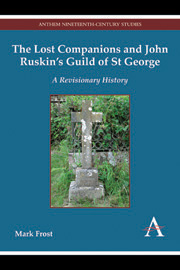Book contents
- Frontmatter
- Dedication
- Contents
- List of Illustrations
- Preface
- Frequently Cited Sources
- Introduction
- Chapter One Roots
- Chapter Two Glimpsing Eden: 1867–70
- Chapter Three ‘At Least a Beginning’: 1871–75
- Chapter Four Opportunities: 1875–77
- Chapter Five Dreams and Nightmares: 1878–81
- Chapter Six The Long Decline and the Great Dispute: 1882–1900
- Afterword
- Appendix Companions of the Guild of St George: Early Lists
- Notes
- Bibliography
- Index
Chapter Six - The Long Decline and the Great Dispute: 1882–1900
Published online by Cambridge University Press: 05 October 2014
- Frontmatter
- Dedication
- Contents
- List of Illustrations
- Preface
- Frequently Cited Sources
- Introduction
- Chapter One Roots
- Chapter Two Glimpsing Eden: 1867–70
- Chapter Three ‘At Least a Beginning’: 1871–75
- Chapter Four Opportunities: 1875–77
- Chapter Five Dreams and Nightmares: 1878–81
- Chapter Six The Long Decline and the Great Dispute: 1882–1900
- Afterword
- Appendix Companions of the Guild of St George: Early Lists
- Notes
- Bibliography
- Index
Summary
By 1881 the door was effectively shut on the possibility of agricultural progress, and the predominance of the museum was established. Opportunities to unleash the energies of working-class activists had been lost, leaving the Guild devoid of meaningful direction. The final eighteen years of Ruskin's Mastership were in one sense little more than a playing out of a path long set by his ideological approach, misfortunes, and failings, but they were also years of intensely fractious internal debate. The deleterious effects of Ruskin's mental health became more marked as he grew incapable of any sustained Guild work, and failed to organise an orderly transition of power. As he withdrew into the final, largely silent Brantwood years, Ruskin became, to different constituencies of the Guild, a hallowed or reviled figurehead. Amidst tension, inaction, and uncertainty, a great dispute broke out amongst them about the treatment of its estate workers, a dispute that ended with victory for those seeking to protect the Master, and defeat for those pursuing what they saw as Ruskinian social justice. Just as silence fell over life at Brantwood, a more profound silence obscured the conflict and the events that this monograph has finally been able to discuss.
Up until 1877 Fors had acted, at least in part, as a mouthpiece for St George. After March 1878, it ceased functioning as a regular monthly and as a vehicle for utopia. After resumption in 1880, eight further letters were issued before the final, 96th Fors was released in 1884. The late Fors were often introspective, elegiac, and solemn in tone, but rarely discussed Guild matters. Late editions summarised Guild principles and brought fleeting talk of education (29.466–69, 472–73, 484–87), but these were valedictory comments. While Ruskin retained hope for the future, he made clear his incapacity to lead it. At Christmas 1883, he opined that the Guild’s lands and £4,000 fund ‘justify the Companions of St. George in sitting down peaceful-minded [...] to their Christmas cheer; and perhaps also the Master in calling with confidence on all kind souls whom his words may reach, to augment the hitherto narrow fellowship’.
- Type
- Chapter
- Information
- The Lost Companions and John Ruskin's Guild of St George , pp. 197 - 220Publisher: Anthem PressPrint publication year: 2014



